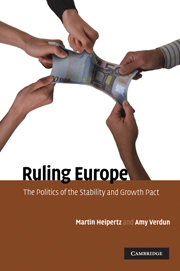Book contents
- Frontmatter
- Contents
- List of tables
- Foreword by Jean-Claude Juncker, Prime Minister of Luxembourg and President of the Eurogroup
- Preface
- Acknowledgements
- List of abbreviations
- 1 The politics of the Stability and Growth Pact
- Part I
- Part II
- 6 Implementation of the SGP in good and in bad times
- 7 From bad times to crisis
- 8 The SGP before the European Court of Justice
- 9 The SGP in times of financial turbulence and economic crisis
- 10 Conclusion: The past, present and future of the SGP and implications for European integration theory
- Appendix
- Bibliography
- Index
8 - The SGP before the European Court of Justice
Published online by Cambridge University Press: 06 July 2010
- Frontmatter
- Contents
- List of tables
- Foreword by Jean-Claude Juncker, Prime Minister of Luxembourg and President of the Eurogroup
- Preface
- Acknowledgements
- List of abbreviations
- 1 The politics of the Stability and Growth Pact
- Part I
- Part II
- 6 Implementation of the SGP in good and in bad times
- 7 From bad times to crisis
- 8 The SGP before the European Court of Justice
- 9 The SGP in times of financial turbulence and economic crisis
- 10 Conclusion: The past, present and future of the SGP and implications for European integration theory
- Appendix
- Bibliography
- Index
Summary
This chapter deals with the aftermath of the SGP crisis of 25 November 2003, which led to a legal contest between the Commission and the Council and subsequently a so-called ‘review’ of the SGP. Following the memorable ECOFIN meeting, a case served before the ECJ in July 2004, which unearthed the dual nature of the SGP. The court decision triggered the perceived need for a revision of the SGP, which took place in spring 2005.
The structure of this chapter is as follows. The first section offers an account of these events. The second section provides an analysis, again using our theoretical framework to understand the developments. The events will become understandable mainly from a functional and expertocratic perspective, even though towards the end of the argument we also benefit from the intergovernmentalist and domestic politics lenses once more.
The court case
Commissioner Solbes had evoked the possibility of taking legal action against the Council immediately after the 25 November 2003 crisis. The Commission's legal services reported to him in early January 2004 on the chances of winning before the ECJ. Thus, Solbes felt sufficiently confident when he went public and labelled the Council ‘conclusions’ illegal. The main argument of the Commission was that the Council could not legally have adopted ‘conclusions’ on the basis of Article 104.9 after having failed to come to a decision on the recommendation under Article 104.8.
- Type
- Chapter
- Information
- Ruling EuropeThe Politics of the Stability and Growth Pact, pp. 154 - 173Publisher: Cambridge University PressPrint publication year: 2010



